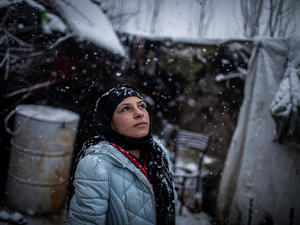UNHCR reports increase in flight of Iraqi Christians; reiterates advice on protection needs
UNHCR reports increase in flight of Iraqi Christians; reiterates advice on protection needs
UNHCR is dismayed that on 15th December Sweden once again forcibly returned a group of some 20 Iraqis to Baghdad. Among this group - sent back on the eve of Ashura - were five Christians originally from Baghdad.
UNHCR staff in Baghdad interviewed three of the Christians and three Iraqi Muslims among the group - all said that they originated from Baghdad. One of the Christian men said he escaped Iraq in 2007 after militiamen directly threatened to kill him. Fearing for his life, he traveled through several countries in the Middle East and Europe before reaching Sweden where he applied for asylum. He said his claim was rejected three times in 2008 and that his claims were not accepted as he was not considered to have been personally targeted. The others we spoke to said their asylum claims were rejected on the basis of improved security conditions in Iraq.
UNHCR strongly reiterates its call on countries to refrain from deporting Iraqis who originate from the most perilous parts of the country.
This forced return comes at a time when our five offices in Iraq are noting a significant increase in Christians fleeing Baghdad and Mosul to the Kurdistan Regional Government Region (KRG) and Ninewa plains. Since the Baghdad church attack on 31 October and subsequent targeted attacks, the Christian communities in Baghdad and Mosul have started a slow but steady exodus. Some 1000 families have arrived since the beginning of November. We have heard many accounts of people fleeing their homes after receiving direct threats. Some were able to take only a few belongings with them. Our offices have distributed emergency assistance and are in contact with the local authorities to ensure that the recently displaced Christians are supported and assisted.
In addition, our offices in neighbouring Syria, Jordan and Lebanon are reporting a growing number of Iraqi Christians arriving and contacting UNHCR for registration and help. Churches and NGOs are warning us to expect more people fleeing in the coming weeks. Many of the new arrivals explain that they left in fear as a result of the church attack on 31 October.
In Syria, since November, some 133 families (300 individuals) have registered with UNHCR, the majority of whom fled Iraq following the October church attack in Baghdad.The number of registrations of Christians in Jordan in the months of October and November has doubled from the same period last year. In September, 57 Christians were registered. This figure rose to 98 and 109 in October and November respectively.
The majority of new arrivals interviewed by UNHCR staff in Jordan claim they left as a direct result of the church attack on 31 October. One man who is now registered with UNHCR in Jordan narrowly escaped the attack, having left the church minutes before the bombing took place. This refugee had been deported from Europe just days beforehand.
UNHCR recognizes the efforts the Iraqi Government is making to try to protect all its citizens, including vulnerable minority groups such as the Christians. The Iraqi Government has reiterated its commitment to increase the protection of places of worship. While overall civilian casualties are lower this year than last, it appears that minority groups are increasingly susceptible to threats and attacks.
UNHCR reiterates its position that asylum seekers who originate from Iraq's governorates of Baghdad, Diyala, Ninewa and Salah-al-Din, as well as from Kirkuk province, should not be returned and should benefit from international protection, whether in the form of refugee status under the 1951 Refugee Convention or a complementary form of protection. In addition, of course, the merits of the claims of all other Iraqi applicants need to be considered carefully, including those who are religious minorities. Our position reflects the volatile security situation and the still high level of violence, security incidents, and human rights violations taking place in parts of Iraq. UNHCR considers that serious - including indiscriminate - threats to life, physical integrity or freedom resulting from violence or events seriously disturbing public order are valid reasons for international protection.






